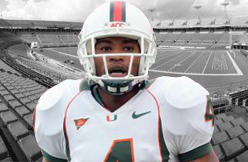Coral Gables — Glenn Sharpe feels some sense of justice.
He can see it, too. It's big and blinding and encrusted with diamonds, just how he would picture a 2002 national championship ring would look on his finger.
Instead of a "U" as the centerpiece, though, this ring features a fleur-de-lis — the French symbol that's the logo of the New Orleans Saints.
Sharpe got a Super Bowl ring as a practice-squad player for the Saints last season.
"It's kind of funny because I told a lot of guys, 'Hey man, I feel like I deserve this ring because I was cheated out of my ring in college,'" Sharpe said, laughing. "This ring vindicates me."
Seven years have passed since that fateful pass interference call in the Fiesta Bowl. On fourth-and-3 from the 5 in overtime, Ohio State quarterback Craig Krenzel's pass to Chris Gamble in the end zone was broken up by the freshman Sharpe.
The Hurricanes rushed the field to celebrate their second consecutive national title. About three seconds after the play, Big 12 referee Terry Porter threw a flag: pass interference. Miami would end up losing 31-24 in two overtimes.
"I don't feel bad for [Sharpe] because he didn't do anything. He got victimized," said former UM running back Quadtrine Hill (2002-05). "It's like being upset at somebody for being shot at."
Sharpe, a Miami Carol City grad, says he hasn't spoken to Gamble, a Dillard grad, about that play. Was it pass interference?
"There's no doubt," said Sharpe, who was Ohio State receiver Michael Jenkins' teammate in the NFL. "I know he knows what happened because when I was first with the [ Atlanta] Falcons, Jenkins used to say all the time, 'Yeah man, Chris was like, "Man, you know that was no pass interference."' But he was going to take it 'cause the ref gave it to him."
Added Sharpe: "Even Jenkins said that [it wasn't interference]. He was like, 'Yeah, they got you.'"
Gamble, coincidentally, was a cornerback himself. He was occasionally used as a receiver. That night, Gamble was on the field for 107 plays. Fourth-and-3 from the 5 was the most pivotal.
"I don't hold any grudges against Ohio State or the refs," Sharpe said. "I just feel he made a bad call and in his heart he knows he made a bad call."
Publicly, Porter said otherwise.
He told reporters after the game, "I replayed it in my mind. I wanted to make double-sure that it was the right call."
Later, the Big Ten supervisor of officials, used by the NCAA to assign officials for bowl games, and Big 12 commissioner would support Porter's call. Referee magazine even deemed it one of the "Best 18 Calls of All Time."
Most of the country, though, sided with Miami.
Meanwhile, no one on Ohio State's team talked about the play the night of the national championship game or in the days after, former OSU running back Lydell Ross said.
"We could have cared less about the call," he said.
Four plays before the pass interference, Jenkins made a 17-yard catch on fourth-and-14 to keep OSU alive.
"That's just how much of an effect that call has had," Ross said. "Everything's overlooked — the catch by Michael Jenkins, the winning touchdown by Maurice Clarett, the strip that Clarett had in that game of Sean Taylor. Nobody wants to talk about that. Everybody wants to talk about the call."
Sharpe said he's watched the controversial play just twice in seven years: first to see if there was anything that would have warranted the flag, then to see if there's anything he could have done better.
"I would feel much worse if I actually did [commit] pass interference," Sharpe said. "But since I know I didn't, it kind of frees my mind."

(sun-sentinel.com)



